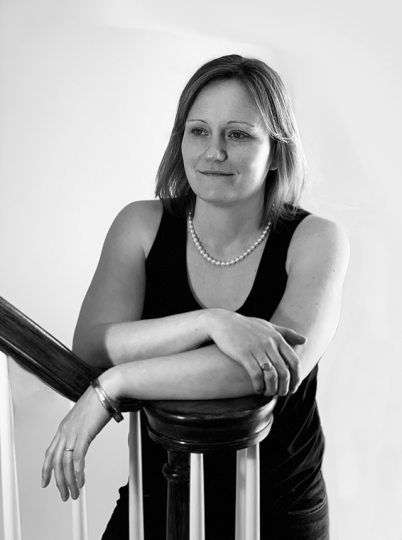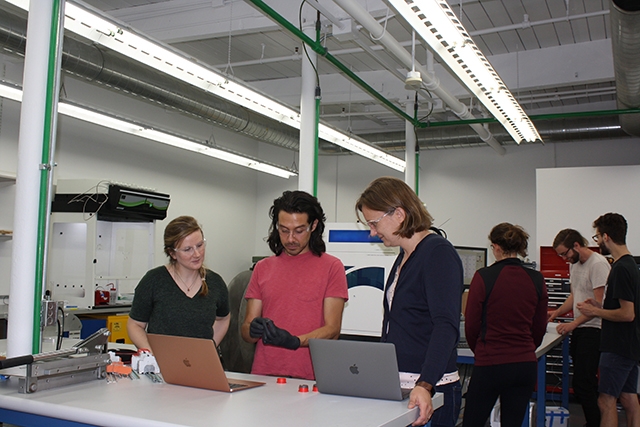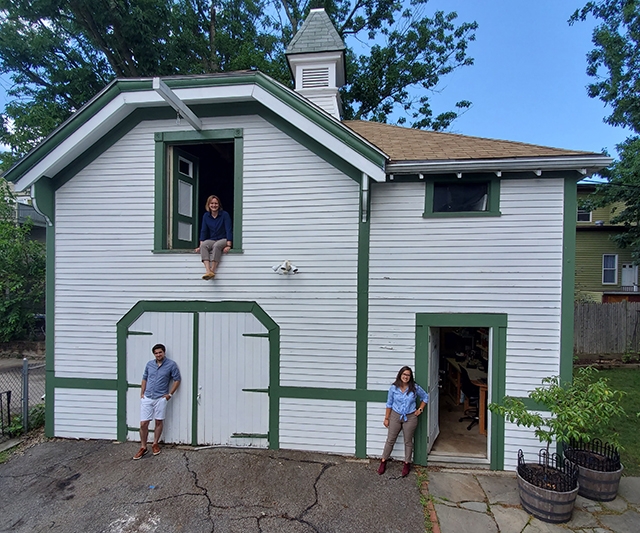Car buyers in the U.S. purchased more than 122,000 hybrid- and battery-electric vehicles in March, a record monthly high that roughly quadruples the number sold per month in 2011, according to data from Argonne National Laboratory.
As manufacturers boost production to meet booming demand, they face challenges to reduce the weight of vehicles so they can be electrified but still provide optimal range and power.
Alloy Enterprises, a startup co-founded by Harvard John A. Paulson School of Engineering and Applied Sciences and Graduate School of Arts and Sciences alumna Ali Forsyth, has developed a novel solution. The startup is pioneering a method to streamline the production of strong yet lightweight aluminum parts.
“We thought there was a really good opportunity, as we are seeing electrification of not only passenger vehicles, but following behind it heavy-duty trucks, commercial aircraft, buses, construction equipment, mining equipment, and agricultural equipment,” said Forsyth, who earned a Ph.D. in engineering sciences in 2012. “So we got really excited about the potential opportunity and market size and came up with a completely different technology.”
Aluminum is very strong and light—the alloy’s strength-to-weight ratio is higher than titanium—but the finicky metal is typically very difficult to 3D print, so manufacturers must rely on more traditional, time-consuming techniques to produce the complex parts they need for vehicles.
The process developed by Alloy Enterprises overcomes 3D printing pitfalls by using sheets of aluminum instead of a powder. The system cuts the perimeter of a part from aluminum sheets, layer by layer, and then the layers are bonded isothermally to create complex, three-dimensional shapes, Forsyth explained.
“We want to revolutionize how aluminum parts are made. Aluminum is everywhere, and so are cast aluminum parts. If you can make that part in three days instead of four months, that is an incredible opportunity,” she said. “We think the tech is fast enough and affordable enough that it can really scale to production, and people can make small to medium volumes of parts instead of only one or two for testing or evaluation.”
For Forsyth, being founder and CEO of a startup is an exciting prospect, and while she is no stranger to the world of entrepreneurship, it isn’t a career path she had ever envisioned.
Members of the Alloy Enterprises team work in their new lab space. (Photo courtesy of Ali Forsyth)
A competitive ringette player, she became interested in exercise physiology and biomechanics because of her athletic background (ringette is a Canadian sport that is similar to ice hockey, but players use straight sticks and a rubber ring instead of a puck). After earning an undergraduate degree in bioengineering from Syracuse University, her passion for learning inspired her to pursue a Ph.D. at SEAS.
In the lab of Howard Stone (a former SEAS faculty member who is now Dixon Professor of Mechanical and Aerospace Engineering at Princeton University), she studied how red blood cells deform inside medium-sized blood vessels, which has implications for how the body controls blood pressure.
“I became fascinated by hemodynamics and loved how quickly you could build microfluidic devices,” she said. “It was challenging to get the fabrication just right and, any time you are studying a biological entity, getting it to cooperate can be challenging at times. I certainly learned a lot of patience.”
Forsyth planned to stay in academia, but she decided to test the waters and try industry before committing to a postdoctoral fellowship. She started an internship at the startup Ev3 Neurovascular (now a part of Medtronic), which was creating stents that can reduce the likelihood of clotting in the neurovascular system.
“Less than a week into this internship, I came home and said ‘I’m meant for industry,’” she recalls. “There was still so much to learn, but I loved the level of productivity in the startup environment. I caught the startup bug and haven’t looked back since.”
Forsyth took on engineering leadership roles at five startups over the next seven years, and felt drawn to the unique challenges of joining a team during a very early stage.
“To get in early and help to form the company and shape its trajectory and technical roadmap, and turn this early technology and bench-top science into products, has always been fascinating to me,” she said.
She had a chance to explore a range of cutting-edge technology, from an aluminum seawater battery to a large area radiation detector, to a water collection system for the top of cooling towers, to a metal 3D printer.
That metal 3D printer, which she worked on as engineering manager at Desktop Metal, helped inspire Forsyth and a few friends to launch Alloy Enterprises.
“The most important lesson I learned over all these different startups is that who you work with is the most important thing,” she said. “Finding the perfect pairing and the people who you really want to go to battle with is absolutely essential.”
After the startup launched last February, the Alloy Enterprises team set up shop in this 130-year-old carriage house. (Photo courtesy of Ali Forsyth)
In mid-February, 2020, Forsyth and her co-founders took a collective deep breath and launched the company.
As they built momentum, they faced a new challenge every day, but every obstacle paled in comparison to the impact the COVID-19 pandemic had on the fledgling company. Due to COVID-19 restrictions, they weren’t able to move into their Somerville incubator space, so the team set up shop in the carriage house on Forsyth’s property.
“It is about 1,000 square feet and 130 years old. The hay went on the top floor and you can see the stall for the horse and where they put the buggy,” she said.
The pandemic also completely disrupted the supply chain and made it more difficult for the team to meet potential customers, pitch to investors, and raise funds.
But they persevered—the team has tripled in size and they have made rapid technical progress, raised two funding rounds, and secured two grants. They also just moved into larger office space.
Looking down the road, Forsyth is excited for the future of Alloy Enterprises, but right now she’s completely focused on the day-to-day challenges.
“We made it through, and we’re stronger because of it,” she said. “So for the next few years, I want to keep churning. Being able to build has been great, but no question the people I have gotten to meet and work alongside have been the most rewarding thing.”
Press Contact
Adam Zewe | 617-496-5878 | azewe@seas.harvard.edu


